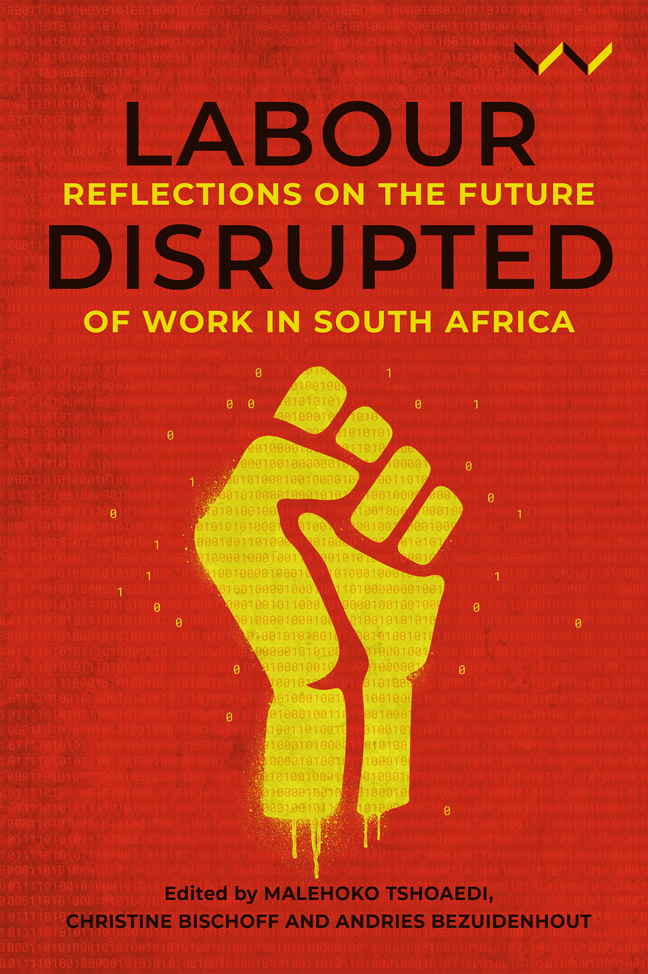Book contents
- Frontmatter
- Contents
- Figures and Tables
- Acknowledgement
- Acronyms
- Introduction: Disruptions and New Directions in South African Labour Studies
- Chapter 1 Fragmented Labour Movement, Fragmented Labour Studies: New Directions for Research and Theory
- PART I Changing Solidarities
- PART II Technology and Work
- PART III New Forms of Organising
- PART IV Labour and Lockdown
- Conclusion: Questions, Answers and New Directions
- Contributors
- Index
Chapter 4 - Community Health Care Workers in Gauteng: Volunteerism as a Band-Aid for Unemployment
Published online by Cambridge University Press: 01 March 2024
- Frontmatter
- Contents
- Figures and Tables
- Acknowledgement
- Acronyms
- Introduction: Disruptions and New Directions in South African Labour Studies
- Chapter 1 Fragmented Labour Movement, Fragmented Labour Studies: New Directions for Research and Theory
- PART I Changing Solidarities
- PART II Technology and Work
- PART III New Forms of Organising
- PART IV Labour and Lockdown
- Conclusion: Questions, Answers and New Directions
- Contributors
- Index
Summary
INTRODUCTION
The fieldwork on which this chapter is based is part of a research project that looks at the relationship between worker education and household livelihoods. While such an approach is rare, the larger study focuses on this relationship because households are seen to be responding to the (un)employment crisis in various ways. Furthermore, exploring the role of worker education in these responses can provide unique insights into household livelihoods. This chapter looks specifically at community health workers (CHWs) and the role that they play in providing primary healthcare services to households and communities under difficult and constrained circumstances. In particular, the chapter considers the precarious employment conditions under which CHWs operate, and posits that this is indicative of one new form that the future of work is taking – one in which volunteerism serves as a temporary and insecure means of employment creation. Sarah Mosoetsa (2011) suggests that households use social resources such as networks, alliances and informal associations to deal with crises. The household is an institution that bears the brunt when other institutions fail to do what is expected. It is seen as the major source for sharing resources like housing, income and psychosocial support.
Mosoetsa (2011) argues that households are now not only sites for reproduction but also sites for production. She states that households used to rely on political parties and trade unions, but these institutions have also been in decline. However, it seems that Expanded Public Works Programmes (EPWPs) are bringing back the relevance of political parties in assisting community members in times of unemployment. Mondli Hlatshwayo (2017) found that most people who access the opportunity of working in the EPWP are those with an African National Congress (ANC) affiliation, in one way or another. The work done by Hlatshwayo (2017) reveals what he regards as localised cadre deployment in the context of EPWP work. Community activism and having a network in the community have been seen as points that allow alignment with employment opportunities.
Although households have had to take on most of the burden, this does not mean they are strong enough or stable enough to do so effectively. Instead, Mosoetsa (2011) refers to them as having fragile stability, with a great deal of gender and generational conflict, among others.
- Type
- Chapter
- Information
- Labour DisruptedReflections on the Future of Work in South Africa, pp. 97 - 116Publisher: Wits University PressPrint publication year: 2023

